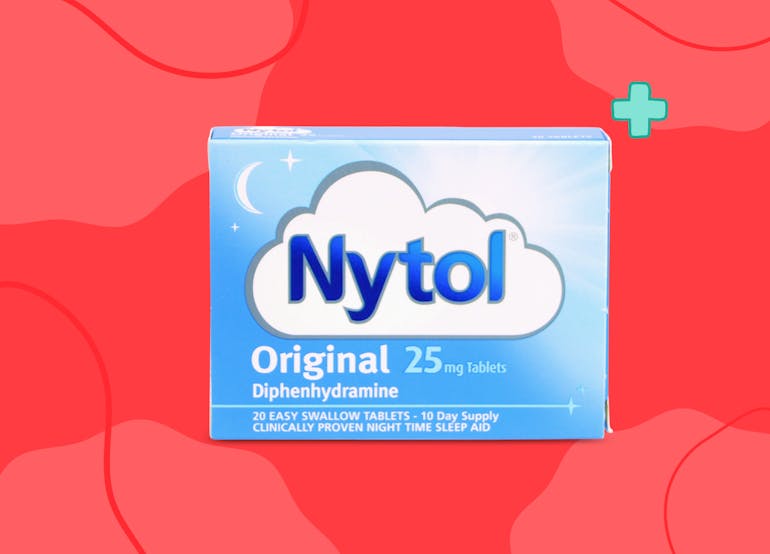Can you overdose on Nytol?
Reviewed and fact-checked by Giulia Guerrini, Superintendent Pharmacist. Read our editorial policy to see how we create informative, accurate content.
Just like any other strong medication, Nytol has some side effects.
You should always use Nytol as indicated on the instructions because an excess of Nytol could lead to a seizure, cardiac arrest, coma or death.
In this article, we’ll go through the main case studies about how diphenhydramine (the main ingredient in Nytol) can be fatal. In fact, diphenhydramine shows high toxicity and it can lead to death.
We’ll also explain what is Nytol and what signs you should look for when there is an Nytol overdose.
To be clear – we’re talking about Nytol Original and Nytol One-A-Night tablets here, which you’ll need to be approved to buy, and not Nytol Herbal varieties, which do not contain diphenhydramine.
What is diphenhydramine and why it can be dangerous?
Diphenhydramine is an antihistamine medication that treats allergy symptoms. It is classified as a drowsy (sedating) antihistamine and is more likely to cause sleepiness than other antihistamines.
When you take Nytol for better sleep, especially if you have a short term sleeping problem, your body feels more relaxed. You can take one pill, and you’ll sleep all night.
But take too many pills over the recommended dosage, and you could be in danger of not waking up.
This isn’t to scare you – it’s to keep you informed about how to safely take Nytol and recognise when you’ve taken too much (which ideally won’t happen).
So, what are the biggest cases of Nytol overdose? What early signs is our body showing when in overdose?
Read on for information on Nytol side effects, when taken to the extremes.
What is Nytol?
The problem with allergies, hay fever and common cold is that they prevent you from having a proper, well deserved good night sleep. This is because most short term and seasonal diseases also lead to hitching, coughing, blocked noses, and sneezing that prevents you from relaxing and sleeping.
Nytol is a gentle solution to this problem because it relaxes your body and helps you to sleep.
Before deciding to purchase Nytol, ask one of our pharmacists whether it’s the right choice for you. Our friendly pharmacists can help you decide which drug is best for your unique situation. Typical situations when Nytol is prescribed are:
- Short term insomnia due to hay fever, cold or blocked nose
- Any type of allergy that prevents your sleep
Three Nytol overdose case studies
So you want to know more about Nytol overdose cases? Here is a selected list the most popular ones, also subjects of academic and scientific research.
Nytol abuse caused death in the UK
This is an article of how a man died after abusing Nytol.
The man was only 32 years old wasn’t able to sleep because he was addicted to video games, and he played also during the night.
As he wasn’t able to get any prescription for sleep-related medications, he asked his friends to provide him with Nytol, an over the counter medication.
After abusing Nytol, he was found dead in his kitchen with a fatal dose of 6.6mg of diphenhydramine per litre of blood in his body – fatal levels are usually between 8mg and 31mg per litre.
Seizure caused by diphenhydramine toxicity
In the second case study, a 23 year old female was hospitalised after ingestion of diphenhydramine. Also in this case, she didn’t have any previous medical history, so we are talking about a perfectly fine individual.
Her severe toxicity caused seizure that lasted about 30 seconds and tachycardia. Then her hearth stopped beating and she was given quick, low energy shockfor resuscitation.
Luckily she woke up after a few minutes and came back to life.
Cardiac arrest by diphenhydramine overdose in the US
In this case study, a 45 year old man without any bad medical history was hospitalised. He then passed away after 16 hours. The reason for this tragic death is due to the high concentration of diphenhydramine found to be 18.7 μg/mL.
Although DPH is relatively safe for over the counter use, it causes dose-dependent toxicity and can be fatal if overdosed.
Signs you should look for when Nytol overdose
There are several signs on a human body that you want to check, if you want to know whether an overdose is happening.
- Vomiting. This only happens rarely in less than 1% of cases, but Nytol can make you vomit. Together with causing nausea, the excess of diphenhydramine taken on an empty stomach is the cause of vomiting.
- Confusion. Older adults may be more sensitive to the drug's side effects, particularly drowsiness, dizziness and confusion. Drowsiness, dizziness, and confusion can all increase the likelihood of a fall.
- No urination. If you have a problem with your bladder, taking too much Nytol can make it worse. Also, if you have a history of bladder problems, it’s common to stop urinating and this is a big sign of a Nytol overdose.
- Very dry mouth and eye. It only happens in 1 to 10% of cases, but it’s a typical side effect of the diphenhydramine toxicity. Of course, when taken in high doses, it becomes a poison.
Conclusion
Make sure you don’t excess your recommended dose of Nytol to stay healthy and enjoy this medication. You can ask an expert for advice or read the instructions within the package.
If you have any questions or signs of an overdose, call your doctor immediately.
Nytol overdose FAQs
How long does the Nytol overdose last?
The elimination diphenhydramine for adult patients is approximately 9 hours (range: 7 to 12 hours) and 13.5 hours (range: 9 to 18 hours) for elderly patients (range: 9 to 18 hours).
What is the recommended dose of Nytol?
Adults and children 12 years of age and older should take 25 mg to 50 mg by mouth at bedtime to help them sleep.
Can you take 2 Nytols at once?
It is possible to overdose on diphenhydramine. If you took more than the recommended dose, you may incur into an overdose. We don’t recommend it.

